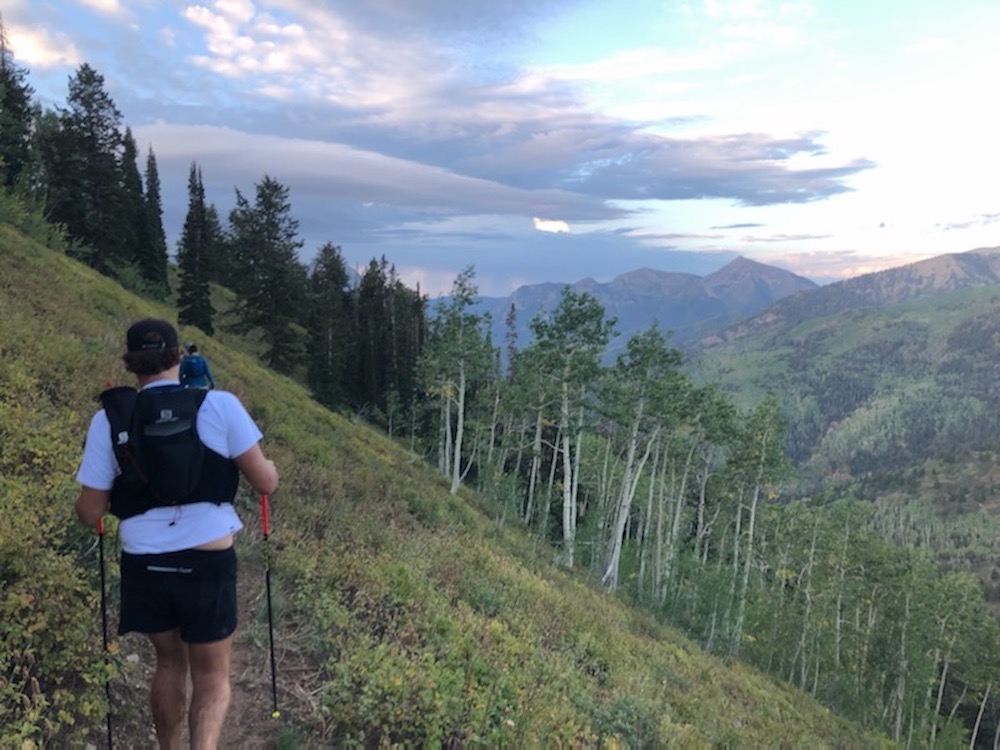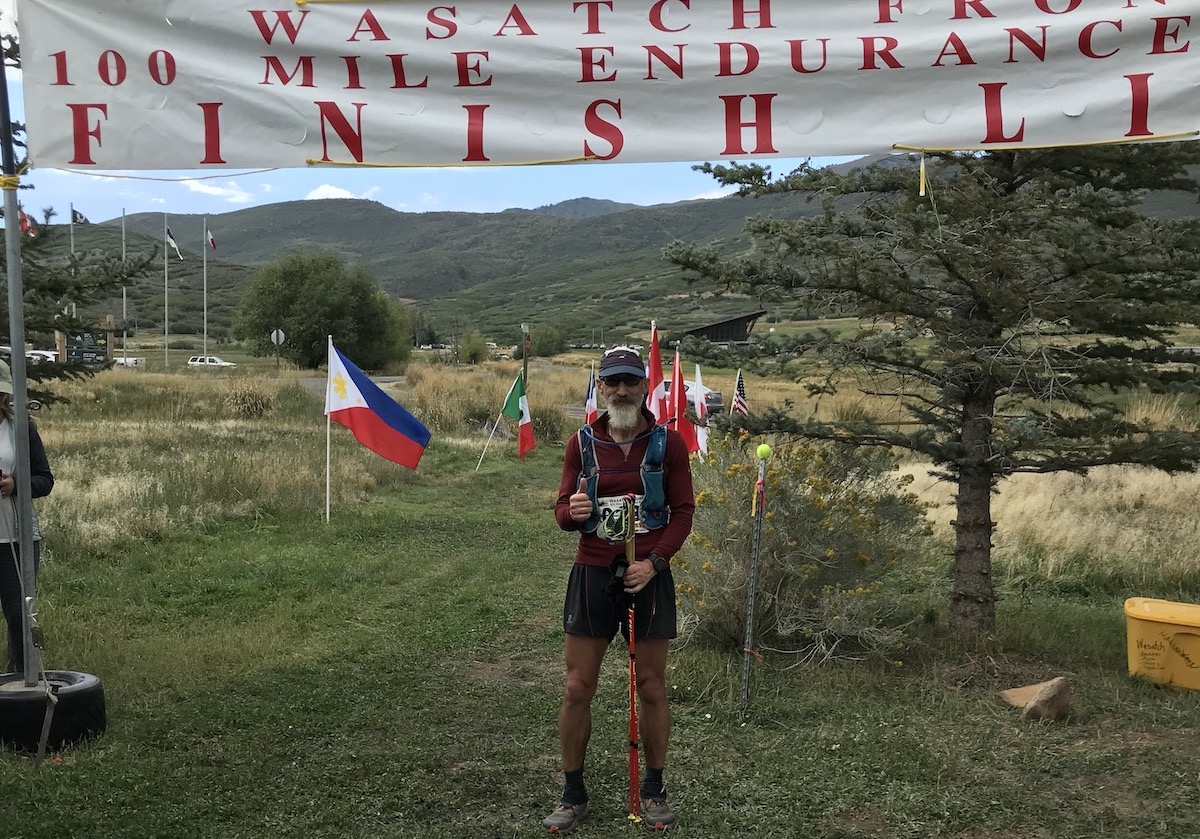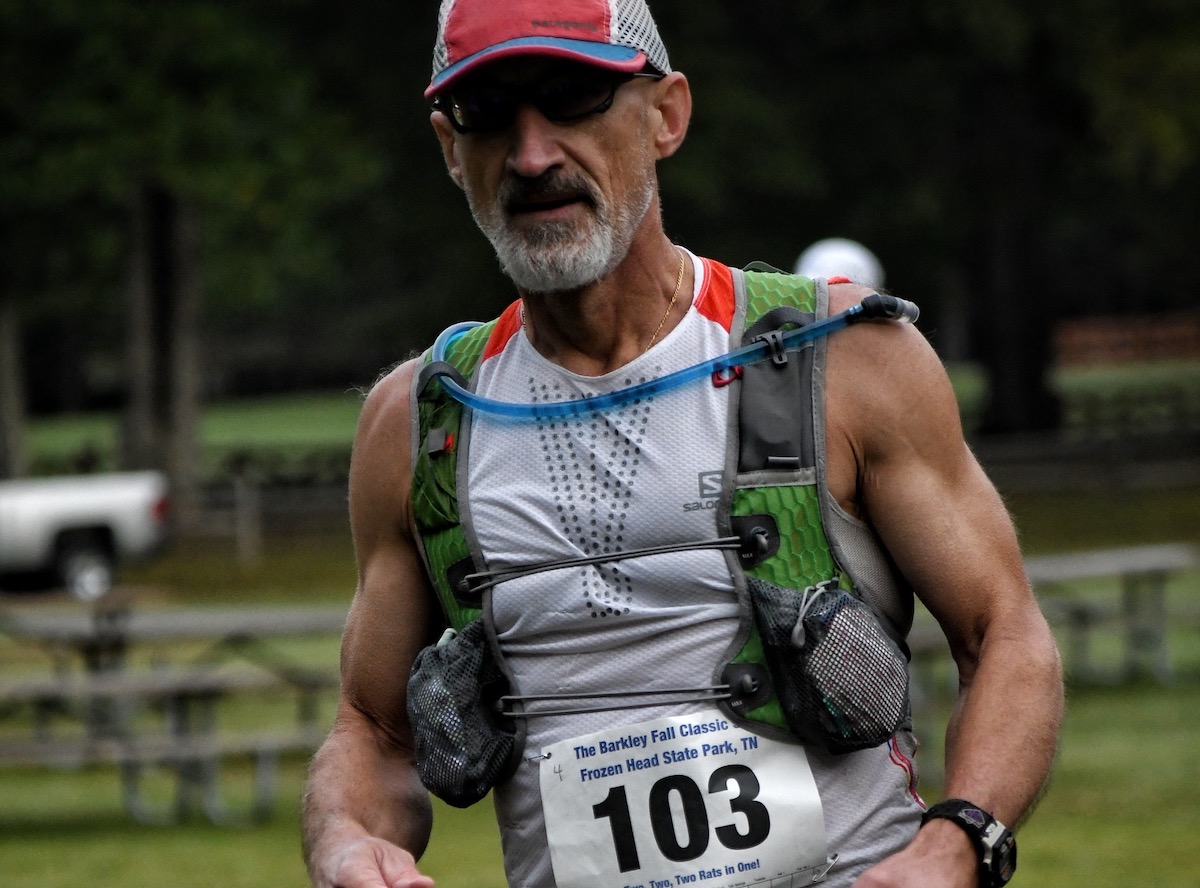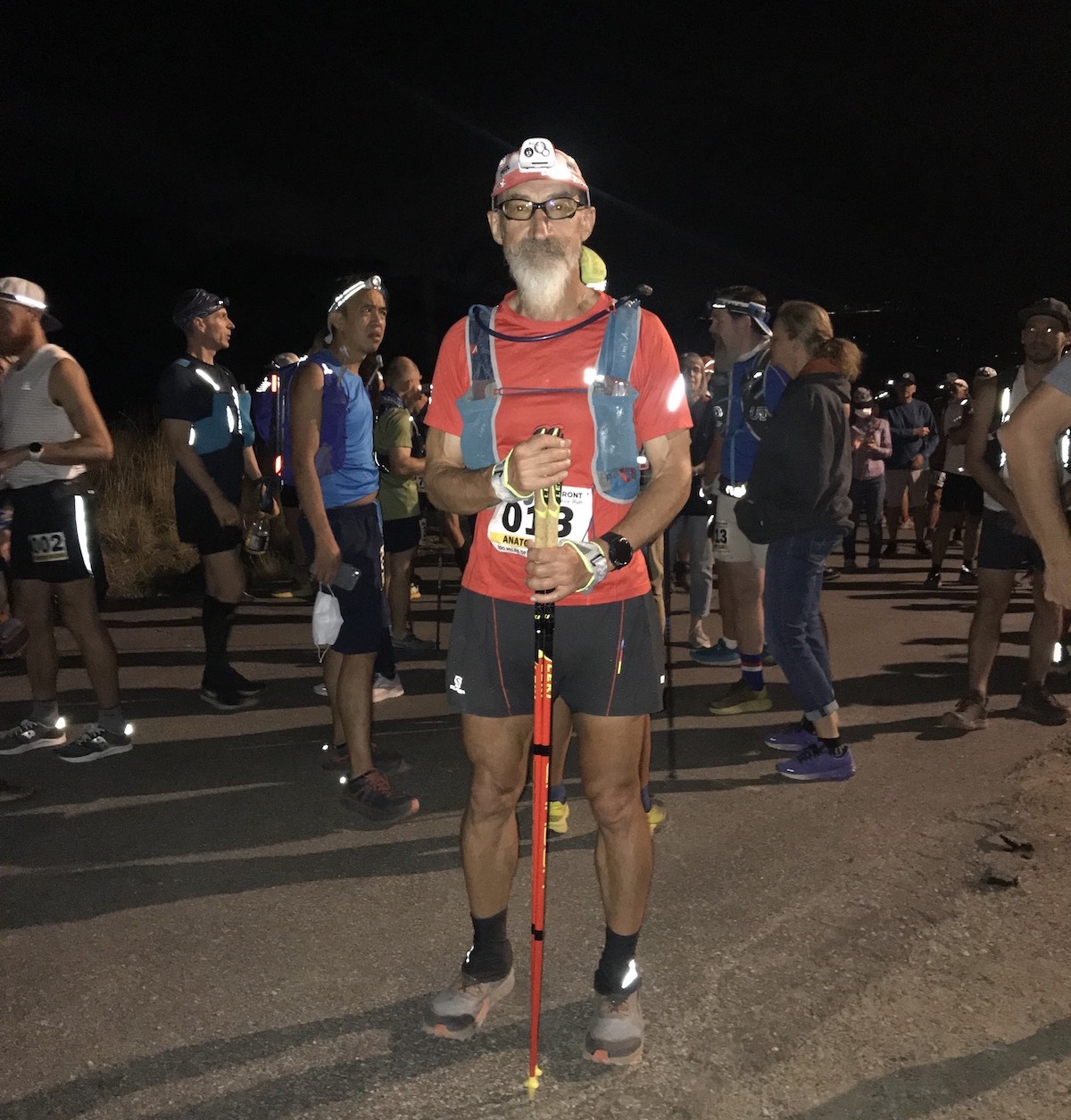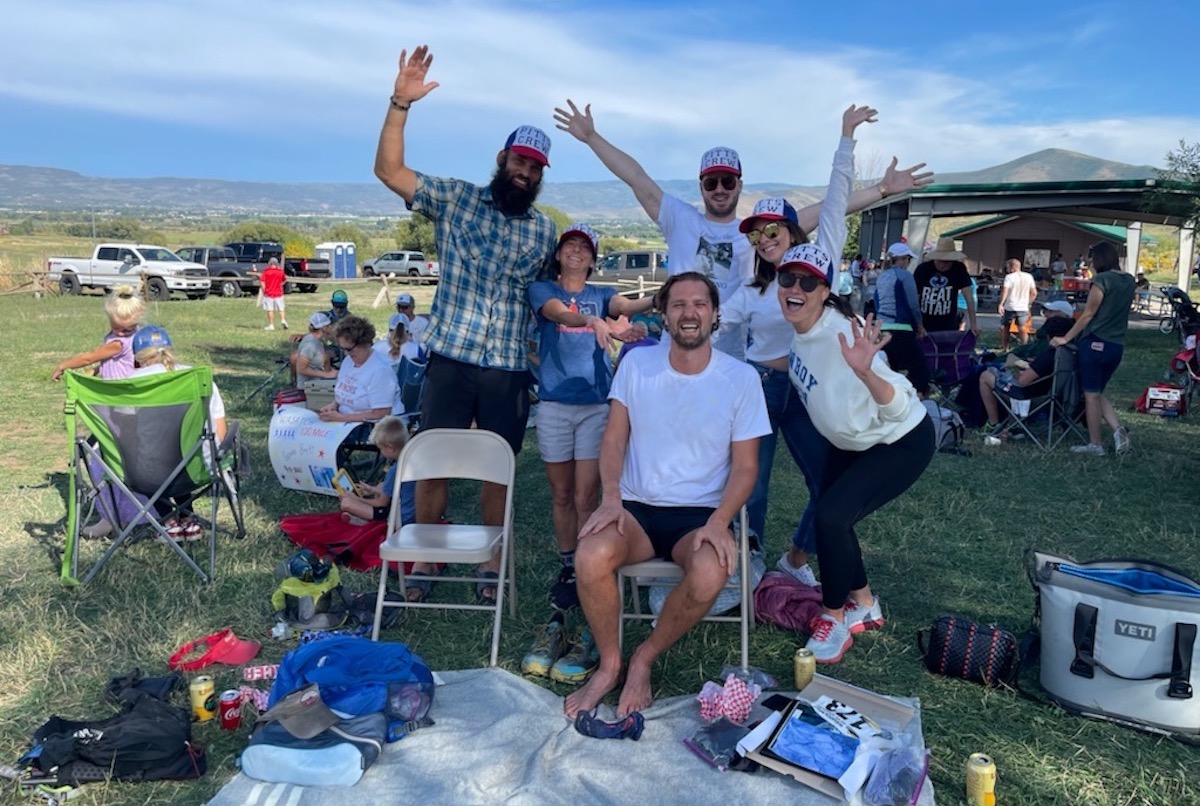My friend John Pitts and I are just beyond Big Mountain Pass aid station, around mile 34 of the Wasatch Front 100 Mile. I’m pacing, and the afternoon sunshine and warmth feel wonderful to me as we move along the high mountain trails. I’m thinking about how good it is to be alive and out of Texas for the weekend. John, on the other hand, who is more than a foot taller than I am and outweighs me by close to 80 pounds, is feeling hot and defeated on the exposed terrain.
I know John will revive in the cool night air. He just needs to keep moving for the next five hours to get there. The Wasatch 100 has a 36-hour cutoff. Runners need to average 21:30-minutes-per-mile pace to finish. John was moving at a good clip the first 50 kilometers of the race, but now we’re walking at a 23-minutes-per-mile pace. I look down at my watch again. Twenty-six minutes per mile.
It’s as if John’s expectations about his ability to move faster are physically weighing him down. The slower he hikes, the greater the weight of unmet expectations, and the slower he hikes. The burden of these expectations is compounded by the miles he still has to cover. Sixty-six miles to go. At three miles per hour, the time ahead probably feels like a roadblock. He stops and calmly begins to dig deep. Tom Remkes, 59 years old and a 23-time (now 24-time) Wasatch 100 finisher, hikes past us. We tell him, “Nice job!” and watch him hike away.
At the Wasatch 100 this year, 10 runners over the age of 45 crossed the line with 11 or more finishes. Tom Remkes was one of two 24-time finishers. Thank you to Davy Crockett for compiling this multi-year finisher list:
- Max Bliss – age 53, 24 finishes
- Tom Remkes – age 59, 24 finishes
- Jeff Holdaway – age 62, 22 finishes
- Colleen Ford – age 59, 19 finishes
- Carter Williams – age 63, 19 finishes
- Shane Martin – age 54, 19 finishes
- Nicholas Bassett – age 76, 19 finishes
- Mark Christopherson – age 53, 12 finishes
- Guy Hardcastle – age 53, 11 finishes
- Rich McDonald – age 45, 11 finishes
Tom Remkes is 20 years John’s senior. While John wills himself through this dark patch, I wonder if Tom or any of the other masters runners on the course today are similarly burdened by the expectation that they’d be able to move faster than they are currently moving. As you get older, is it easier to accept what your body is (or isn’t) capable of in the moment? In his book, The Practice of Groundedness: A Transformative Path to Success That Feeds — Not Crushes — Your Soul, Brad Stulberg writes that the acceptance of “…what is happening without fusing your identity to it,” is one of the factors that allows for success. Stulberg wasn’t talking specifically about ultrarunnning, but is it easier for older runners to separate their identities from their running performances than it is for younger runners?
I stop pondering the benefits of age because, sunbaked and mentally burdened or not, John starts to forge ahead. His pace will safely meet the overall cutoff again. He finishes in impressively good style in 34:39:13. This was his first 100-mile race.
Interview With Anatoly Ross After the 2021 Wasatch Front 100 Mile
After the race, I talked with Anatoly Ross, a Canadian runner from Ontario, who finished the Wasatch 100 this year in 33:31:11 about low points and questions I had pondered during the race.
Anatoly is a 57-year-old ultrarunner, competing since 2012 when he jumpstarted his career with the Canadian Death Race. Since then, he’s competed in many rocky and rooty ultras on the U.S. East Coast including Eastern States 100 Mile, Cruel Jewel 100 Mile, Grindstone 100 Mile, Massanutten Mountain Trails 100 Mile, Vermont 100 Mile, Old Dominion 100 Mile. Anatoly has also completed UTMB, and he’s competed a few times at Big Dog’s Backyard Ultra and many times at the Barkley Fall Classic 50k.
[Editor’s Note: The following interview has been edited for brevity and clarity.]
iRunFar: What were your expectations going into the Wasatch 100 this year?
Anatoly Ross: This one is actually not a good year for me. If I said to you that my volume going into the Wasatch 100 was 20 miles a week, how would that sound? A couple of years ago, I sustained a hip injury. At first I thought it was a strain or a sprain, but it didn’t heal. An MRI showed some cartilage changes in my right hip joint. I have surgery scheduled in October for a tear in the cartilage lining the right hip joint. So when I got the diagnosis, I backed off on the mileage.
My preparation for the Wasatch 100 was done running on a treadmill at a 20% incline. My treadmill is an old one, and I don’t want to invest in anything new, so it only goes to 12%, but I put a brick and plywood underneath to get it to 20%. I ran at about five miles per hour and usually my heart rate was around 180 beats per minute. I was working to maximize my cardiovascular fitness with the uphill running, with as low impact as possible on my hip. I also lost 10 pounds to help unload my right hip. It’s just physics. They wouldn’t let me roll my entry over, so I had no choice.
iRunFar: So there was never a point in the race when you felt like you weren’t meeting your expectations of yourself as a runner?
Ross: No, my goal was just to stay conservative and finish. It was purely preservation to get a qualifier for the Hardrock 100 and Western States 100.
iRunFar: How did the race go for you?
Ross: I executed my best skills well, and I stayed conservative when my hip hurt the most. I started the first climb fast because Mother Nature just made me a very good climber. But then when it came to the descent, I was very conservative. I got many cramps as well. That was due to lack of training, so I had to be very careful. At my age, I can’t touch under 24 hours, but under 30 is possible with good training.
iRunFar: Is it easier at 57 years old to accept what your body is capable of in the moment? Is that acceptance more a factor of age or running experience?
Ross: We’ve all heard that ultrarunning is 90% mental and 10% physical. I kind of disagree. I think it’s 80% and 20%. The mental game must be there. Getting older makes you mentally tougher, which allows you to deal with all experiences better. I’m still competitive. You have to be realistic though.
iRunFar: When did you have low points during the race?
Ross: I couldn’t find my girlfriend for 30 minutes at the Brighton Lodge aid station at mile 69. It was raining and I cooled off and my legs were frozen. It took another 30 minutes for me to get going again. You want to sleep. You want to lay down. But in one or two hours, I was okay.
iRunFar: Has your training changed much from when you started running ultras?
Ross: My volume was huge when I started. I ran up to 200 miles a week. Sometimes I’d run two 50ks on the weekends, and 20 miles a day during the week. Now, I’ll probably only do about 100 miles a week max.
iRunFar: Do you think some older runners have an advantage in mountain races because they’re more willing to hike early in the race and they are also more likely to make time to train to hike fast?
Ross: To be able to hike fast is a key element of at least finishing a race like the Wasatch 100. If you hike fast, you could even go under 30 hours. [Author’s Note: That would be just under an 18-minutes-per-mile pace.] But you can’t lose any time at aid stations. Hiking uses different muscles. It stresses the joints differently than running.
iRunFar: Do you train to hike fast?
Ross: Not generally. But this year, I did spend the three weeks before the race in Colorado with my girlfriend hiking 14ers. We hiked up and down very fast.
2021 Wasatch Front 100 Mile Age Group Results
- Women’s 45-to-49 age group – Erin Hill, 29:36:56 (Record: Heather Culig, 25:38:02)
- Men’s 45-to-49 age group – Jeremy Hurl, 26:33:52 (Record: Jay Aldous, 22:03:40)
- Men’s 50-to-54 age group – Steve Leichty, 24:48:10 (Record: Jack Pilla, 21:47:43)
- Women’s 55-to-59 age group – Colleen Ford, 35:30:40 (Record: Deanna McLaughlin, 29:10:37)
- Men’s 55-to-59 age group – Nick Mastrodemos, 33:00:49 (Record: Alfred Bogenhuber, 22:56:00)
- Men’s 60-to-64 age group – Carter Williams, 31:03:37 (Record: Rick Miller, 27:25:19)
- Mens 65-to-69 age group – Carl Tippets, 35:27:33 (Record: Richard Opsahl, 31:28:00)
- New men’s age 75-to-79 age group record – Nicholas Bassett, 35:30:40
Call for Comments
- As you get older, is it easier for you to accept what your body is capable of in the moment?
- Do you think this kind of acceptance makes it easier for you to maximize your performance?
- Is acceptance of a situation more a function of ultrarunning experience or age?
- Has it become easier for you to separate your identity and your emotions from your running performances over time?
- Has that helped your ability to compete in races and/or to complete them?
- Do you train to hike fast?
